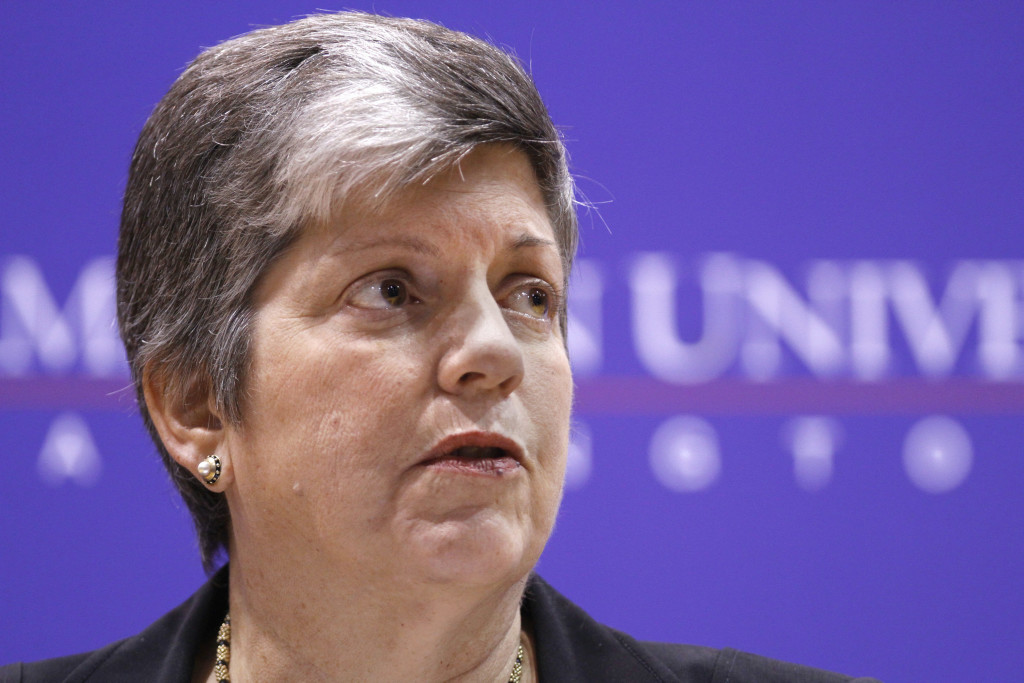Sec. Napolitano: Time for a “Reality Check” on Immigration

October 6, 2011
Share
In a blunt speech yesterday, Secretary of Homeland Security Janet Napolitano took on critics of the Obama administration’s immigration policy. At the heart of the issue, she explained, is a tension between enforcing the current law while pushing for comprehensive reform.
“Not surprisingly, our policies have been simultaneously described as engaging in a mean-spirited effort to blindly deport record numbers of illegal immigrants from the country and alternatively as comprehensive amnesty that ignores our responsibility to enforce the immigration laws,” she said.
Napolitano repeatedly blamed Congress for inaction, leaving states “to pass a patchwork of their own laws in an attempt to fill the void,” and she touted the administration’s record deportation numbers, focusing on the deportation of criminals and repeat immigration offenders:
In 2010, ICE removed over 195,000 convicted criminals, more than had ever been previously removed by ICE, and 81,000 more than it removed in FY 2008. For the first time in decades, 50 percent of the aliens removed by ICE had been convicted of a criminal offense. In 2011, ICE will again remove a record number of convicted criminals from our country.
We have achieved similar results with regard to setting priorities for the removal of those termed “non-criminals.” More than two-thirds of those in this category who were removed in 2010 were either recent border crossers or repeat violators.
Napolitano announced that this year’s deportations will “again be at historic levels.” [Just last week, Immigrations and Customs Enforcement (ICE) announced it had detained nearly 3,000 illegal immigrants with criminal records.] Anticipating criticism, she explained, “While the overall number of individuals removed will exceed prior years, the composition of that number will have fundamentally changed. It will consist of more convicted criminals, recent border crossers, egregious immigration law violators, and immigration fugitives than ever before.”
Napolitano also addressed the heated controversy over Secure Communities, a post-9/11 program that uses computer technology and local law enforcement to identify illegal immigrants for possible deportation. Critics say it’s actually picking up non-criminals or people who have committed minor crimes (writing a bad check; speeding; driving without a license), and that it’s sowing mistrust among the immigrant population.
In recent months, the administration has issued both a prosecutorial discretion memo [PDF] to help ICE agents prioritize people who to detain and deport, and a promise to review about 300,000 deportation cases to weed out folks who have lived in the U.S. for years without committing crimes.
While acknowledging the program “got off to a bad start,” Napolitano says that this adjusted version of Secure Communities is refined, effective and isn’t going away anytime soon:
Termination of this program would do nothing to decrease the amount of enforcement. It would only weaken public safety, and move the immigration enforcement system back towards the ad hoc approach where non-criminal aliens are more likely to be removed than criminals.
Reactions to the speech varied. Dallas Morning News writer Gabriel Escobar praised her words, calling the speech “the most articulate defense of the administration’s policies.” In states like Massachusetts, where Gov. Deval Patrick [D] has refused to participate in Secure Communities, the speech was largely seen as a strategic counter to the governor’s stance. And in the national political arena, The New York Times’ Julia Preston pointed out that the “strong on enforcement” stance speaks directly to GOP critiques in recent presidential debates.
Related Documentaries
Latest Documentaries
Related Stories
Related Stories
Explore
Policies
Teacher Center
Funding for FRONTLINE is provided through the support of PBS viewers and by the Corporation for Public Broadcasting, with major support from Ford Foundation. Additional funding is provided the Abrams Foundation, Park Foundation, John D. and Catherine T. MacArthur Foundation, Heising-Simons Foundation, and the FRONTLINE Trust, with major support from Jon and Jo Ann Hagler on behalf of the Jon L. Hagler Foundation, and additional support from Koo and Patricia Yuen. FRONTLINE is a registered trademark of WGBH Educational Foundation. Web Site Copyright ©1995-2025 WGBH Educational Foundation. PBS is a 501(c)(3) not-for-profit organization.





















